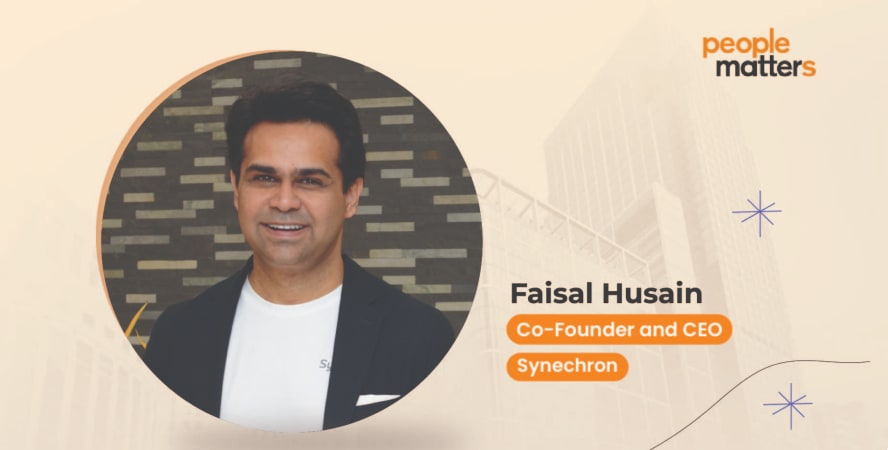Synechron CEO's Winning Formula: Agile, ethical, and culturally strong

Synechron is a New York-based information technology and consulting company that specialises in the financial services industry. Founded in 2001 by Faisal Husain, Zia Bhutta, and Tanveer Saulat, the company has grown to over 14,000 employees across 17 countries, covering North America, Europe, the Middle East, APAC, and India.
In this interview, the co-founder and CEO provide insights into his leadership style and the priorities for the company.
Here are the edited excerpts.
How do you envision your CEO role evolving, including changes to your leadership style, and increased responsibilities for both employees and business operations at Synechron?
As the CEO of Synechron, I see my role as a mix of business and cultural leader for our 14,000+ employees spread across our 40 offices worldwide. I rely on my executive team across the organisation to bring challenges to my attention, identify what we can do better, create new opportunities, and help develop new programmes for our employees to thrive and be appreciated while parallelly growing Synechron’s business.
As a company, we work collaboratively to help our clients achieve their business goals. To accomplish this, we must create a strong culture for happy, motivated, innovative teams who work diligently. I count on everyone to help me build the best business that is honest in its approach with innovative tech and forward-thinking strategies.
Also Read…
How L&T's SN Subrahmanyan is repositioning the conglomerate
As a leader, I must steer this ship. I'm committed to staying nimble and facing any challenge, internal or external as they arise. That remains my mission as I lead this organisation.
Looking ahead to 2023, what do you see as the biggest challenges and opportunities for Synechron in the current business environment, particularly in the financial services industry?
In 2023, we anticipate a great year, albeit with potential challenges due to various business and environmental factors. Our financial services clients may face difficulties from high-interest rates and recessionary pressures. Workforce freezes or reductions are affecting many businesses. To overcome these hurdles, executives must remain vigilant about corporate margins and bottom lines.
Having said that, I see these very same challenges as yet another opportunity for Synechron to do what we do best – consult our clients on how to modernise their global operations, adopt digital platforms and applications, and enable greater functionality and operating efficiencies through targeted innovative technology solutions. Synechron has never sought to ‘disrupt’ business with cutting-edge technologies. Instead, we use our expertise in developing toolboxes of customisable innovative solutions, such as artificial intelligence and data science, to solve real-world business problems and reduce costs.
How is Synechron leveraging digital transformation to drive business growth and adapt to the changing market? Can you share some examples?
At Synechron, we've always prioritised digital transformation as a core element of our philosophy. Our goal is to add value to financial services clients while growing our business. Embracing a digital mindset is the first step toward adopting digital ways of working. Sometimes, organisations need a push in the right direction. When the pandemic hit, we swiftly transitioned to digital to protect our employees and continue serving our clients without compromising project timelines. We ramped up our digital processes across our global offices, and many of these innovations have become permanent fixtures in our business operations. This experience taught us a crucial lesson about the importance of being nimble and ready to pivot quickly to meet evolving business needs and remain competitive.
In terms of long-term sustainability and resilience, what steps is Synechron taking to ensure that it remains an ethical and trustworthy business that is able to meet the evolving needs of its clients?
Building resilience is a skill that can be learned and sustained through strategic planning for the future. However, agility is equally crucial in adapting to unforeseen circumstances beyond our control. It also involves identifying and evaluating new opportunities that complement or expand our business capabilities, providing added value to our clients.
I believe that sustainable business practices always involve working within a consistent ethical framework that prioritises the needs of our clients. Our commitment to honesty and integrity has earned us the trust of our clients, and we prioritise maintaining those relationships as we develop and implement systems, platforms, and advanced applications to help our clients achieve their objectives. In addition to sustaining our business in the long term, we also aim to grow by attracting the best and brightest talent who share our vision.
With the shift towards remote work and flexible work arrangements, how is Synechron addressing the needs and preferences of its employees? What measures have you put in place to support remote work and maintain productivity and collaboration among your teams?
Synechron rapidly transitioned to lockdown, the shelter-in-place mode in response to the pandemic. This taught us the importance of alternative ways of working and being flexible to accommodate different potential scenarios and the needs of our employees. Today, we offer hybrid and/or flexible working arrangements across most of our global office locations, based on project requirements. We also recognise the importance of accommodating those who prefer to work full-time in our physical offices. By offering a range of work arrangements, we aim to maximise team productivity and satisfaction while catering to the diverse needs of our workforce.
This interview is part of an exclusive series that featured CEOs and MDs of top organisations sharing their perspectives on the ever-evolving business landscape and the future of work. Browse all the interviews here!


